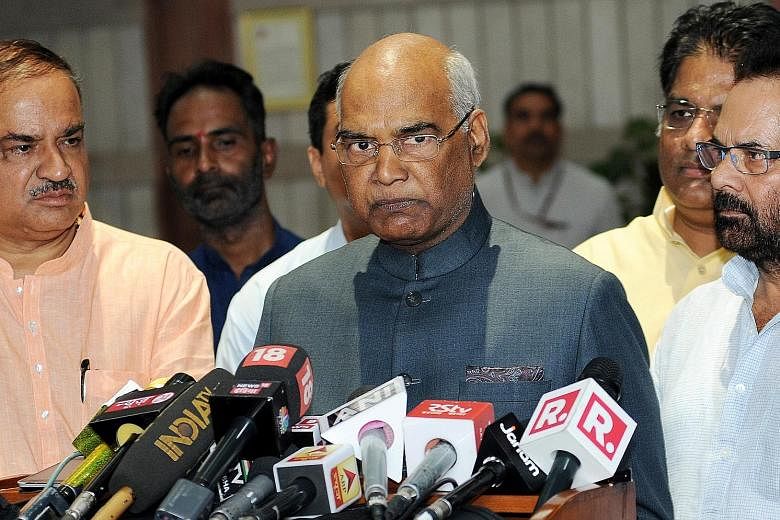India's new President Ram Nath Kovind, 71, has always flown under the radar. When he was nominated as the presidential candidate by the ruling Bharatiya Janata Party (BJP) last month, headlines in the Indian media included: "Who is Ram Nath Kovind?"
Even though Mr Kovind, a member of the Dalit caste - formerly known as "untouchables" - has been governor of the state of Bihar and also a BJP spokesman, he has stayed out of the spotlight.
A lawyer by training, Mr Kovind is a farmer's son and comes from similar humble beginnings as Prime Minister Narendra Modi, who rose from being a tea seller to the chief minister of Gujarat and then prime minister.
"Shri Ram Nath Kovind... devoted his life to public service & worked for (the) poor & marginalised," tweeted Mr Modi last month.
"With his illustrious background in the legal arena, Shri Kovind's knowledge and understanding of the Constitution will benefit the nation," Mr Modi said.
Born in the state of Uttar Pradesh, Mr Kovind, who has seven siblings, studied in the local village school. His family is from the Koli caste, which belongs to the Dalit community. Kolis have traditionally been in the weaving and clothing business but have gone on to be farmers, join the government service, or be fishing folk.
Mr Kovind worked hard through school and went on to study commerce and then law at Kanpur University. He is married to Ms Savita Kovind and has a daughter Swati Kovind and a son Prashant Kumar.
Those who know him and know of him in the party said he has good organisational skills and is a no-fuss politician.
Dr Vijay Chauthaiwale, who heads the BJP's foreign affairs department, said: "He is a very old party functionary and has grown through the hierarchy of the party. He is articulate but at the same time quite a low-profile person."
In 2015, Mr Kovind was picked by the BJP to be governor of Bihar state, an appointment opposed at the time by Chief Minister Nitish Kumar because he had not been consulted by the party.
But Mr Kovind's quiet and non-controversial run as governor led to Mr Kumar changing his tune to the extent that he has broken with opposition ranks to support him as President.
Before entering politics, Mr Kovind practised law, including in the Supreme Court.
His got his first taste of politics while he was personal assistant to former prime minister Morarji Desai, an Indian independence activist, between 1977 and 1978.
Mr Kovind is said to have developed close links to the Rashtriya Swayamsevak Sangh (RSS), the ideological backbone of the BJP, and joined the BJP, known as an upper- caste party, in 1991.
He remains ideologically close to the RSS, a missionary outfit rooted in Hindu nationalism, which supported his presidential candidature.
Yet as a member of the Dalit community, which still faces discrimination including not being allowed to eat with upper-caste members in villages, Mr Kovind continued to work for the betterment of Dalits.
He organised free legal aid, particularly for Dalit women, and was president of the BJP Dalit wing as well as of the All India Koli Samaj, or society.
Mr Satyanarayan Pawar, former Congress MP and former president of the All India Koli Samaj, said: "He worked for the upliftment and unity of the community. Under him our organisation became stronger.''
As President, Mr Kovind has vowed to be bipartisan and, during campaigning, also said his priority would be to ensure internal security amid an ongoing border stand-off with China.
"Our nation is the largest and greatest democracy. The office of the President is the most revered. The President also happens to be the supreme commander of the armed forces. The security of the international borders should be our top-most priority," he said.

